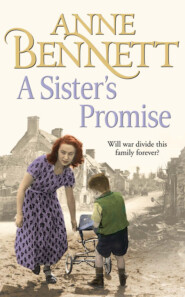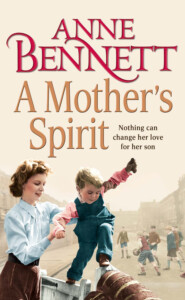По всем вопросам обращайтесь на: info@litportal.ru
(©) 2003-2025.
✖
Keep the Home Fires Burning
Автор
Год написания книги
2018
Настройки чтения
Размер шрифта
Высота строк
Поля
‘Not for flipping hours it won’t.’
‘Oh, stop moaning. It’ll do no good.’
‘I wish Dad was here,’ Tony said wistfully. ‘If he took us down the park or summat I’d probably forget about being hungry.’
‘We all wish Daddy was here,’ Magda said. ‘But it ain’t no good going on about it.’
Tony sighed. Maybe there wasn’t, but there was no way that he was going to stay cooped up in the garden with his kid sisters. ‘Well, I ain’t staying here, anyroad,’ he said. ‘I’m off.’
‘Don’t you dare go to Aunt Polly’s.’
‘I ain’t,’ Tony said, because he knew Magda was right, his mother would be very angry should she find out that he had gone to his aunt’s house to be fed. He had no wish to cope with his mother’s temper as well as starvation. ‘I’m going to find our Jack and have a game of summat.’
When he had gone Magda said, ‘What shall we do? Shall I get our skipping ropes out?’
Missie made a face. Tm bored of skipping.’
‘Tell you what then, let’s see if we can throw two balls at the wall like our Sarah can?’
‘She can do three,’ Missie corrected. ‘I’ve seen her. I have trouble enough doing one.’
‘And me, but Sarah says practice makes perfect.’
‘If you like then,’ Missie said. ‘I don’t care what we do really.’
Magda sighed as she looked at her twin sister. ‘This is probably what being at war’s like,’ she said, ‘and our Sarah says we have to put up with it like everyone else.’
‘I know,’ Missie replied heavily. ‘It’s just everything’s so strange, and I do miss Daddy. But go and get the balls and we’ll see what we can play.’
However, the whole flavour of the day was wrong. Eventually the girls were called in for dinner. Magda sniffed because she loved the smells that would waft through from the kitchen on Sundays: the succulent aroma of a large piece of meat roasting slowly in the oven, surrounded by golden brown potatoes, and there might be apple crumble or treacle sponge bubbling away on the shelf below.
That day, however, she was in for an unpleasant shock for there was no roasting meat and golden brown potatoes and no pudding at all.
Marion didn’t know how long it would be before she had some more money coming in and she had been horrified at the price of meat, which had rocketed up since war had been declared, though no one could give a satisfactory reason as to why this was. So she made a casserole with a small piece of beef she had diced so that it would cook quicker and filled the pot with vegetables.
Usually, while the dinner was cooking Marion would be hard at it making pastries, pies and sponge cakes for Sunday tea, and by the time the dinner was ready there would normally be some of these cooling on wire trays. But Marion knew those teas would be a thing of the past. She had explained it all to her parents, though when she told them of the pittance that she was being given to feed the family they could understand that for themselves.
Everyone was too hungry to grumble about the casserole that day, though, and so they ate it without complaint.
Later Magda said to Missie, ‘It’s great that we haven’t got Grandma Murray to put up with today, ain’t it?’ Missie agreed it was and Magda went on, ‘Maybe Grandma and Granddad will never be able to come again. That would be even better.’
‘Not half,’ Missie agreed. ‘I don’t mind Granddad, though.’
‘I don’t either,’ Magda conceded. ‘He couldn’t come on his own, though. But what’s really smashing is the thought of never having to sit on that blooming horsehair sofa ever again.’
Bill Whittaker had been gone just over a week and they had just received the first letter from him, telling them how he’d settled down in the camp, when Polly came around with news of her own. Only the twins were in the house with their mother because Sarah was shopping and Tony playing out in the street.
‘Oh, Marion, what do you think?’ Aunt Polly said as she came in, her eyes aglow. ‘Our Pat has been offered a fine job at the munitions works at Witton and the wage is six pounds a week.’
Magda, glancing at her mother, knew that she wasn’t overpleased at Pat’s good fortune because her mouth had gone all tight. She shooed the girls into the garden but they lingered in the scullery.
‘I don’t understand why Mom’s so cross about Uncle Pat getting a job,’ Magda said in a low voice. ‘I mean, for years she has been moaning about the fact he doesn’t have one.’
Missie gave a little sigh. ‘I know. I think grownups are really confusing.’
‘Six pounds a week?’ they heard their mother exclaim. ‘What in God’s name does Pat know about making explosives?’
‘Enough, seemingly,’ Polly said. ‘Oh God, Marion, what does anyone know about anything these days? When did you think that you would ever see woman drivers and conductors on the trams, or working alongside men in the factories? The world has been turned on its head and I suppose Pat will be trained like all the rest. Anyroad,’ she added with a touch of pride, ‘they must think he had something about him because he only went for a job in the factory, like, and when he said as how he failed his medical to get in the army because of his flat feet they offered him the job as foreman.’
‘Sarah was right,’ Missie whispered. ‘It was just flat feet after all.’
‘Well, I hope it stays fine for you,’ the twins heard their mother say in a sort of clipped voice. Then she added, ‘Have you time to stay for a cup of tea?’
‘I shouldn’t,’ Polly said. ‘And I can’t stay too long, but I will have a quick cup because we haven’t had a good old natter for ages.’
‘Out, quick,’ Magda said, pushing Missie in front of her, and they escaped to the garden before their mother would catch them eavesdropping.
Later that night, when the house was still, Marion admitted to herself that she couldn’t be really happy for her sister’s good fortune, just incredibly envious. Polly had been poor all her married life and now she would have plenty of money, at least as long as the war lasted, while she, Marion, would have to scrimp and scrape. It was her husband who was putting his life on the line, not Polly’s. She found it very hard not to feel resentful.
Clara quite understood how Marion felt when she next came round.
‘It hardly seems fair that my Bill will soon be risking his life daily for a pittance,’ Marion said to her mother, ‘and because Pat Reilly is not fit for that, he’s sitting pretty and earning a wage many would give their eyeteeth for.’
‘I know,’ Clara said. ‘And all this came about because they said he had flat feet. I ask you! If they had refused him because he had chronic liver failure, I could have understood it more. Anyroad, Marion, just imagine how bad the others after jobs were for Pat Reilly to be the best of them.’
Marion gave a grim smile. ‘I thought that too.’
‘And, of course, Pat’s fine wages will do them no good at all,’ Clara said. ‘It will just dribble through Polly’s fingers.’
Marion thought that a little unfair, for Polly was always very good with money, but she didn’t say anything because for once her mother seemed to understand how aggrieved she had felt at her sister’s good fortune. ‘And just think, with extra money at his disposal, Pat Reilly could easily drink himself into an early grave. Mind you, in his case that could be a blessing.’
‘Oh, Mam!’ Marion said, shocked.
‘Don’t tell me you haven’t thought the same, for I’ll not believe it.’
A crimson flush flooded Marion’s face because her mother was right, though she felt so ashamed of it. ‘Bill always said there wasn’t that much wrong with Pat,’ she ventured.
‘There is a great deal wrong with a man who takes a young girl down and fills her belly every year without any idea how he is going to provide for any of his kids. They have lived like paupers.’
They had, as Marion knew only too well, so why then couldn’t she take joy in the fact that life was going to be easier for them from now on? That she couldn’t disturbed her because she realised she was not half as generous as her sister, who didn’t seem to have a resentful bone in her body.
As one week followed another no bombs fell and the only sign that Britain was at war at all was the news of ships being sunk, and everyone trying to cope with the blackout. Those who could, stayed indoors when darkness fell because to venture out was risking life and limb in such inky blackness.
The Government advised people to paint white lines on the kerbs outside their houses, and around any trees, pillar boxes and lampposts to try to cut down on the number of accidents.
‘It won’t work, of course,’ Polly said. ‘The white paint won’t show up in the pitch black any more than any other colour would.’
‘I know,’ Marion said. ‘It’s stupid, and so was sending the kids away when we’ve had no bombs. A lot of mothers like Phyllis Cox are bringing them back home.’











